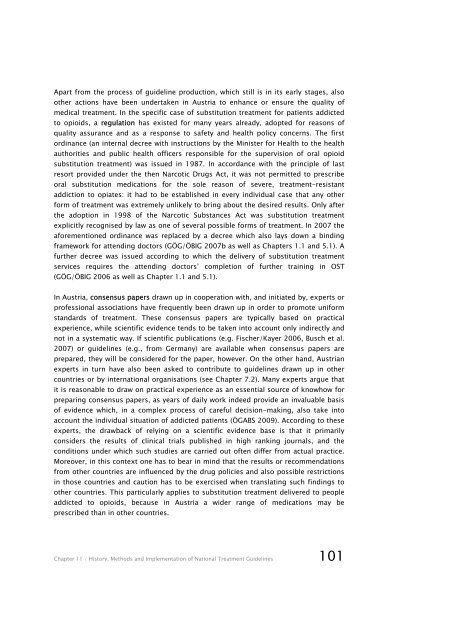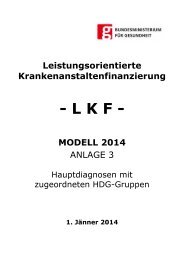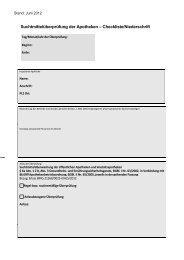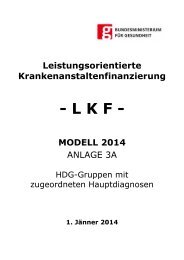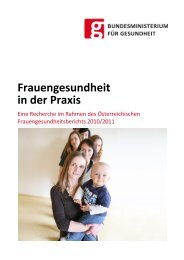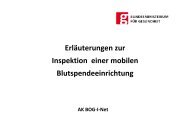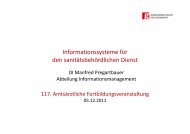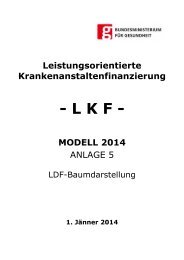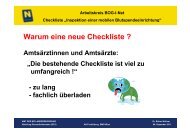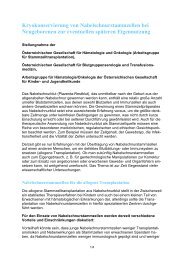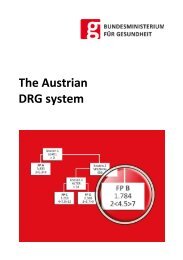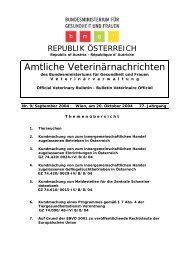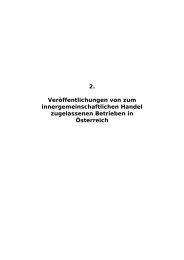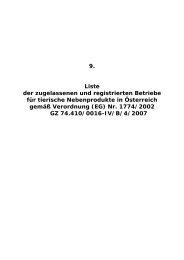Report on the Drug Situation 2010 - Bundesministerium für ...
Report on the Drug Situation 2010 - Bundesministerium für ...
Report on the Drug Situation 2010 - Bundesministerium für ...
You also want an ePaper? Increase the reach of your titles
YUMPU automatically turns print PDFs into web optimized ePapers that Google loves.
Apart from <strong>the</strong> process of guideline producti<strong>on</strong>, which still is in its early stages, also<br />
o<strong>the</strong>r acti<strong>on</strong>s have been undertaken in Austria to enhance or ensure <strong>the</strong> quality of<br />
medical treatment. In <strong>the</strong> specific case of substituti<strong>on</strong> treatment for patients addicted<br />
to opioids, a regulati<strong>on</strong> has existed for many years already, adopted for reas<strong>on</strong>s of<br />
quality assurance and as a resp<strong>on</strong>se to safety and health policy c<strong>on</strong>cerns. The first<br />
ordinance (an internal decree with instructi<strong>on</strong>s by <strong>the</strong> Minister for Health to <strong>the</strong> health<br />
authorities and public health officers resp<strong>on</strong>sible for <strong>the</strong> supervisi<strong>on</strong> of oral opioid<br />
substituti<strong>on</strong> treatment) was issued in 1987. In accordance with <strong>the</strong> principle of last<br />
resort provided under <strong>the</strong> <strong>the</strong>n Narcotic <strong>Drug</strong>s Act, it was not permitted to prescribe<br />
oral substituti<strong>on</strong> medicati<strong>on</strong>s for <strong>the</strong> sole reas<strong>on</strong> of severe, treatment-resistant<br />
addicti<strong>on</strong> to opiates: it had to be established in every individual case that any o<strong>the</strong>r<br />
form of treatment was extremely unlikely to bring about <strong>the</strong> desired results. Only after<br />
<strong>the</strong> adopti<strong>on</strong> in 1998 of <strong>the</strong> Narcotic Substances Act was substituti<strong>on</strong> treatment<br />
explicitly recognised by law as <strong>on</strong>e of several possible forms of treatment. In 2007 <strong>the</strong><br />
aforementi<strong>on</strong>ed ordinance was replaced by a decree which also lays down a binding<br />
framework for attending doctors (GÖG/ÖBIG 2007b as well as Chapters 1.1 and 5.1). A<br />
fur<strong>the</strong>r decree was issued according to which <strong>the</strong> delivery of substituti<strong>on</strong> treatment<br />
services requires <strong>the</strong> attending doctors’ completi<strong>on</strong> of fur<strong>the</strong>r training in OST<br />
(GÖG/ÖBIG 2006 as well as Chapter 1.1 and 5.1).<br />
In Austria, c<strong>on</strong>sensus papers drawn up in cooperati<strong>on</strong> with, and initiated by, experts or<br />
professi<strong>on</strong>al associati<strong>on</strong>s have frequently been drawn up in order to promote uniform<br />
standards of treatment. These c<strong>on</strong>sensus papers are typically based <strong>on</strong> practical<br />
experience, while scientific evidence tends to be taken into account <strong>on</strong>ly indirectly and<br />
not in a systematic way. If scientific publicati<strong>on</strong>s (e.g. Fischer/Kayer 2006, Busch et al.<br />
2007) or guidelines (e.g., from Germany) are available when c<strong>on</strong>sensus papers are<br />
prepared, <strong>the</strong>y will be c<strong>on</strong>sidered for <strong>the</strong> paper, however. On <strong>the</strong> o<strong>the</strong>r hand, Austrian<br />
experts in turn have also been asked to c<strong>on</strong>tribute to guidelines drawn up in o<strong>the</strong>r<br />
countries or by internati<strong>on</strong>al organisati<strong>on</strong>s (see Chapter 7.2). Many experts argue that<br />
it is reas<strong>on</strong>able to draw <strong>on</strong> practical experience as an essential source of knowhow for<br />
preparing c<strong>on</strong>sensus papers, as years of daily work indeed provide an invaluable basis<br />
of evidence which, in a complex process of careful decisi<strong>on</strong>-making, also take into<br />
account <strong>the</strong> individual situati<strong>on</strong> of addicted patients (ÖGABS 2009). According to <strong>the</strong>se<br />
experts, <strong>the</strong> drawback of relying <strong>on</strong> a scientific evidence base is that it primarily<br />
c<strong>on</strong>siders <strong>the</strong> results of clinical trials published in high ranking journals, and <strong>the</strong><br />
c<strong>on</strong>diti<strong>on</strong>s under which such studies are carried out often differ from actual practice.<br />
Moreover, in this c<strong>on</strong>text <strong>on</strong>e has to bear in mind that <strong>the</strong> results or recommendati<strong>on</strong>s<br />
from o<strong>the</strong>r countries are influenced by <strong>the</strong> drug policies and also possible restricti<strong>on</strong>s<br />
in those countries and cauti<strong>on</strong> has to be exercised when translating such findings to<br />
o<strong>the</strong>r countries. This particularly applies to substituti<strong>on</strong> treatment delivered to people<br />
addicted to opioids, because in Austria a wider range of medicati<strong>on</strong>s may be<br />
prescribed than in o<strong>the</strong>r countries.<br />
Chapter 11 / History, Methods and Implementati<strong>on</strong> of Nati<strong>on</strong>al Treatment Guidelines 101


